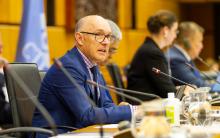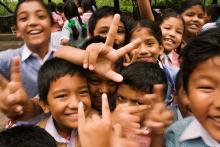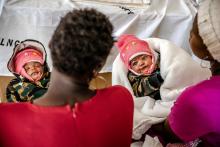The State of Mental Health Globally in the Wake of the COVID-19 Pandemic and Progress on the WHO Special Initiative for Mental Health (2019-2023)
Although major advancements in our understanding of what causes mental health conditions and how to treat them have been made in the last 20 years, very few improvements in service coverage and quality have been made.
Overcoming Babel: Why Translation Is Key to Lasting Peace and Development
As globalization flows into every corner of the virtual and physical worlds, and geopolitical and cultural tensions rise, accurate, professional translation mediates the potential cultural and language barriers in politics, national security and diplomacy, as well as between communities.
We Are Running Out of Time
This year’s United Nations Climate Change Conference—COP 27—will arguably be the most important climate conference of the decade. From 6 to 18 November 2022, world leaders gathering in Sharm el-Sheikh, Egypt must put words into action to hold the increase in global temperature to 1.5°C.
We Can All Help Reduce Food Loss and Waste
Food loss and waste (FLW) implies unnecessary pressure on the environment and the natural resources used to produce it in the first place. It essentially means that land and water resources have been wasted, pollution created and greenhouse gases emitted to no purpose.
Let’s Recommit to Protecting Students, Educators and Schools from Attack
Education is fundamental, even during war. Access to learning can give children and young people the knowledge and abilities needed to contribute to their communities and economies—and the skills to resolve disputes and rebuild after conflict.
The Other Victims of Enforced Disappearance
Aside from the legal debate on the concept of the victim in an enforced disappearance and the lack of political will in many situations to fulfil victims’ rights, it is indisputable that the next of kin of the disappeared suffer as much and sometimes more than those who are no longer present.
Ending Nuclear Testing to Advance Global Peace and Security
While the Comprehensive Nuclear-Test-Ban Treaty has already helped advance the nuclear non-proliferation and disarmament agenda, we must remain vigilant. The proliferation of nuclear weapons and the threat of their use continue to pose unacceptable risks to humanity.
Future-Proof Skills Can Help Balance Individual and Societal Progress
Conceptual and strategic thinking, creativity, problem-solving, empathy, optimism, ethics, emotional intelligence and judgment are the future-proof skills and attributes that machines will not be able to replicate with the same standards and agility as qualified human beings.
All Stakeholders Have a Role to Play in Ridding the World of Chemical Weapons
The process of destroying chemical arsenals declared to OPCW will soon be completed. However, current global events have underscored that preventing the re-emergence of chemical weapons is on an agenda that will remain open forever.
The Global Population Will Soon Reach 8 Billion—Then What?
Meeting the needs and lifting the living standards of a large and growing world population will require higher levels of production and result in greater consumption. Without green reforms in energy, manufacturing and transport, as well as changes in human behaviour, this will place mounting pressures on the natural environment.

























